Articles
- Page Path
- HOME > J Korean Acad Nurs > Volume 38(3); 2008 > Article
-
Original Article
- Development of a Stress Scale for Korean Nursing Students
- Ji-Soo Yoo, Soo Jung Chang, Eun Kyoung Choi, Jee Won Park
-
Journal of Korean Academy of Nursing 2008;38(3):410-419.
DOI: https://doi.org/10.4040/jkan.2008.38.3.410
Published online: June 30, 2008
1Professor, College of Nursing, Yonsei University · Researcher, Nursing Policy Institute, Korea.
2Doctoral Student, College of Nursing, Yonsei University, Seoul, Korea.
3Professor, College of Nursing, Ajou University, Suwon, Korea.
- Address reprint requests to: Park, Jee Won. College of Nursing, Ajou University, San 5 Woncheon-dong, Yeongtong-gu, Suwon 443-749, Korea. Tel: 82-31-219-7011, Fax: 82-31-219-7020, pjwon@ajou.ac.kr
• Received: January 4, 2008 • Accepted: April 21, 2008
Copyright © 2008 Korean Society of Nursing Science
Abstract
-
Purpose
- The purpose of this study was to develop a stress measurement scale for Korean nursing students.
-
Methods
- Sixty preliminary items were selected by classifying 229 basic items extracted via literature review and Q-sorting method. In order to verify the reliability and validity of the preliminary instrument, data were collected from 617 nursing students in 2 colleges of nursing in Korea.
-
Results
- As a result of the item analysis, 58 items were selected. They consisted of 2 types of stress which were college-based stress (38 items) and clinical-based stress (20 items). Ten factors in college-based stress and four factors in clinical-based stress were extracted by factor analysis, and each had a total variance of 63.01%, and 64.93%. Cronbach's Alpha of those 58 items were .937 in college-based stress and .922 in clinical-based stress, which was high.
-
Conclusion
- This paper is meaningful in a way that it has developed a tool capable of measuring stress for nursing students, which reflects the characteristics of our country. It is recommended for further study to re-verify the relevance and stability of this measurement.
- 1. Bae JI. A study on the stress and recognition for psychiatric patients of nursing students during the clinical experience in the psychiatric unit. Journal of Korean Academy of Psychiatric and Mental Health Nursing. 1999;8:411–423.ArticlePDF
- 2. Beck DL, Srivastava R. Perceived level and sources of stress in baccalaureate nursing students. Journal of Nursing Education. 1991;30:127–133.ArticlePubMed
- 3. Choi SJ. Research methods for social work. 2005;Seoul, Nanam publishing house.
- 4. Chu JP, Min BI, Park SG. Perceived sources and coping methods of stress in a population of university students in Korea. Korean Journal of Stress Research. 2001;9(2):41–50.
- 5. Clarke VA, Ruffin CL. Perceived sources of stress among student nurses. Contemporary Nurse. 1992;1:35–40.ArticlePubMed
- 6. Girdano DA. Controlling stress and tension: A holistic approach. 1979;Englewood Cliffs, Prentice Hall Inc..
- 7. Han KS, Kim GM. Comparison to self esteem, family adaptation, health promoting behaviors, and symptoms of stress between nursing and other major university women student. Journal of Korean Academy of Psychiatric and Mental Health Nursing. 2007;16:78–84.ArticlePDF
- 8. Hamill C. The phenomenon of stress as perceived project 2000 student nurses: A case study. Journal of Advanced Nursing. 1995;21:528–536.ArticlePubMed
- 9. Helmstadter GC. Principles psychological measurement. 1964;New York, Appleton-Century-Crofts.
- 10. Johnson S, Cooper C. The construct validity of the asset stress measure. Stress and Health. 2003;19:181–185.Article
- 11. Kim TI. Growth, development and health. 2007;Seoul, Kyomunsa.
- 12. Lee HK. A study on stress and coping method of nursing students. Journal of Korean Academy of Psychiatric and Mental Health Nursing. 2003;12:586–593.
- 13. Lees S, Ellis N. The design of a stress-management programme for nursing personnel. Journal of Advanced Nursing. 1990;15:946–961.ArticlePubMed
- 14. Li H, Lin CD, Bray MA, Kehle TJ. The measurement of stressful events in Chinese college students. Psychology in the Schools. 2005;42:315–323.Article
- 15. Lo R. A longitudinal study of perceived level of stress, coping and self-esteem of undergraduate nursing students: An Australian case study. Journal of Advanced Nursing. 2002;39:119–126.ArticlePubMed
- 16. Lynn MR. Determination and quantification of content validity. Nursing Research. 1986;35:382–385.PubMed
- 17. Mahat G. Stress and coping: First year Nepalese nursing students in clinical settings. The Journal of Nursing Education. 1996;35:163–169.ArticlePubMed
- 18. Mahat G. Stress and coping: Junior baccalaureate nursing students in clinical settings. Nursing Forum. 1998;33:11–19.Article
- 19. Mimura C, Griffiths P. A Japanese version of the perceived stress scale: Translation and preliminary test. International Journal of Nursing Studies. 2004;41:379–385.ArticlePubMed
- 20. Nunnally J. Psychometric theory. 1978;2nd ed.New York, McGraw-Hill Co..
- 21. Park HS, Bae YJ, Jung SY. A study on self-esteem, self-efficacy, coping methods and the academic and job-seeking stress of nursing students. Journal of Korean Academy of Psychiatric and Mental Health Nursing. 2002;9:621–631.
- 22. Parkes KR. Stressful episodes reported by first year student nurses: A descriptive account. Social Science & Medicine. 1985;20:945–953.Article
- 23. Rhead MM. Stress among student nurses: Is it practical or academic? Journal of Clinical Nursing. 1995;4:369–376.ArticlePubMed
- 24. Sanz-Carrillo C, García-Campayo J, Rubio A, Santed MA, Montoro M. Validation of the Spanish version of the perceived stress questionnaire. Journal of Psychosomatic Research. 2002;52:167–172.ArticlePubMed
- 25. Sheu S, Lin H, Hwang S. Perceived stress and physio-psycho-social status of nursing students during their initial period of clinical practice: The effect of coping behaviors. International Journal of Nursing Studies. 2001;39:165–175.Article
- 26. Thyer SE, Bazeley P. Stressors to student nurses beginning tertiary education: An Australian study. Nurse Education Today. 1993;13:336–342.ArticlePubMed
- 27. Timmins F, Kaliszer M. Aspects of nurse education programmes that frequently cause stress to nursing students - fact-finding sample survey. Nurse Education Today. 2002;22:203–211.ArticlePubMed
- 28. Tully A. Stress, sources of stress and ways of coping among psychiatric nursing students. Journal of Psychiatric and Mental Health Nursing. 2004;11:43–47.ArticlePubMed
REFERENCES
Figure & Data
REFERENCES
Citations
Citations to this article as recorded by 

- Stress and emotional well-being among healthcare students: a systematic review and multilevel meta-analysis
Sameer Ansari, Sayyid Shaheer V., Naved Iqbal
Current Psychology.2026;[Epub] CrossRef - Students’ college life adaptation experiences in the accelerated second-degree bachelor of science in nursing program in South Korea
Hyun-Ju Lee, Nayoon Lee
The Journal of Korean Academic Society of Nursing Education.2022; 28(2): 167. CrossRef - Validity and Reliability of the Korean Version of the Stressors in Nursing Students Scale
Mijung Cho, Jisun Lee, Heuijeong Kwon, Bomi Kim
Journal of Korean Academy of Fundamentals of Nursing.2022; 29(1): 24. CrossRef - Development and psychometric testing of nursing students’ perceptions of clinical stressors scale: an instrument design study
Foozieh Rafati, Hamid Sharif Nia, Zohreh Khoshnood, Kelly-Ann Allen
BMC Psychiatry.2021;[Epub] CrossRef - A Cross-Sectional Study: What Contributes to Nursing Students’ Clinical Reasoning Competence?
Soomin Hong, JuHee Lee, Yeonsoo Jang, Yoonju Lee
International Journal of Environmental Research and Public Health.2021; 18(13): 6833. CrossRef - Influence of Anger Expression on Communication Competence of Nursing Students
Soonyang JANG
JOURNAL OF FISHRIES AND MARINE SCIENCES EDUCATION.2020; 32(2): 511. CrossRef - Factors Affecting Clinical Practicum Stress of Nursing Students: Using the Lazarus and Folkman's Stress-Coping Model
Sung Hae Kim, JuHee Lee, MiRa Jang
Journal of Korean Academy of Nursing.2019; 49(4): 437. CrossRef - Differences of Self-Control, Daily Life Stress, and Communication Skills between Smartphone Addiction Risk Group and General Group in Korean Nursing Students
Sohyune R. Sok, Mi Hyeon Seong, Mi Hye Ryu
Psychiatric Quarterly.2019; 90(1): 1. CrossRef - Influence of Stress and Resilience on Student Adjustment to College Life in Senior Nursing Students
Soon-Yang JANG
JOURNAL OF FISHRIES AND MARINE SCIENCES EDUCATION.2018; 30(3): 1075. CrossRef - Survey of factors influencing learner engagement with simulation debriefing among nursing students
Young Sook Roh, Kie In Jang
Nursing & Health Sciences.2017; 19(4): 485. CrossRef - The Effects of a Positive Psychology Program on Nursing Students' Positive Thinking, Ego Resilience and Stress Coping
Soojin Kim, Boyoung Kim
The Journal of Korean Academic Society of Nursing Education.2016; 22(4): 495. CrossRef - Effect of Tai Chi Exercise on Fatigue, Anxiety, and Sleep Patterns in Nursing Students
Young Ju Park, Ja Ok Kim
Journal of muscle and joint health.2016; 23(1): 61. CrossRef - Health Status Assessment Tool Development based on Dietary Patterns in Middle-Aged Women
Hye-Jin Lee, Kyung-Hea Lee
Korean Journal of Community Nutrition.2016; 21(1): 37. CrossRef - The Effect of Knowledge, Attitudes and Prevention Behaviors for Tuberculosis Infection in Nursing Students
Seung Joo Lim, Hyun Joo Lee
Journal of Korean Biological Nursing Science.2016; 18(1): 43. CrossRef - Influence of Clinical practice stress and Communication skills on Ego-resilience of Nursing students
Eun-Joo Jo, Kyoung-Min Lim
Journal of the Korea Academia-Industrial cooperation Society.2016; 17(6): 618. CrossRef - The relationship between sense of humor, stress and depression in the nursing students
Hae Jin Lee, Ye Jung Ko, Seung Woo Han
Journal of the Korean Data and Information Science Society.2016; 27(4): 1035. CrossRef - Factors Influencing Subjective Happiness in Nursing Students: Focused on Psycho-social Factors
Ji-Hye Kim, Hae Ok Jeon
Journal of Korean Academy of Psychiatric and Mental Health Nursing.2016; 25(2): 123. CrossRef - Effects of Personality and Coping Behavior on Clinical Practice Stress among One College Nursing Students
Yu-Jin Jeong, Chin-Kang Koh
Korean Journal of Stress Research.2016; 24(4): 296. CrossRef - Critical Thinking, Self-Concept and Stress Adaptation of Transfer Nursing Students
Hyoung Sook Park, Jung Mi Yun, Young Mi Kim, In Young Choi, Jae Hyun Hwang
Journal of Korean Academy of Fundamentals of Nursing.2016; 23(3): 320. CrossRef - Stress, Emotional Intelligence, Academic Achievement of Nursing Students
Gyoung-Youn Joo, Yeon-Suk Choi
Journal of the Korea Academia-Industrial cooperation Society.2015; 16(11): 7300. CrossRef - The Relationship among Stress in Clinical Practice, Depression and Self-Esteem in Nursing College Students
So Young Kim, Sun Young Lim, Hye mi Choi
The journal of the convergence on culture technology.2015; 1(4): 59. CrossRef - The Effects of Bibliotherapy Program for Competency Enhancement in Nursing Students
Jung-Hoi Kim, Hwang-Ran Ahn, Soon-Nam Pyoun
Journal of the Korea Academia-Industrial cooperation Society.2015; 16(10): 6992. CrossRef - A Study on the Stress, Self-Esteem, Mental-Health and Suicidal-Ideation in Nursing Students
Ha-Yun Jung, Kyung-Soo Lee
Journal of Korean Clinical Health Science.2015; 3(2): 328. CrossRef - Factors Influencing Happiness Index of Nursing Students
Young Suk Kim, Mi Young Han
Journal of Korean Academy of Nursing Administration.2015; 21(5): 501. CrossRef - Stress, Yangsaeng and Subjective Happiness Among Female Undergraduate Nursing Students in the Republic of Korea
Hye Sook Park
The Journal of Korean Academic Society of Nursing Education.2014; 20(4): 471. CrossRef - Study of Stress, Health Promotion Behavior, and Quality of Life of Nursing Students in Clinical Practice and Factors associated with Their Quality of Life
Myung Sook Lee, Keum Soon Kim, Mi-Kyoung Cho, Jung Won Ahn, Suno Kim
Journal of muscle and joint health.2014; 21(2): 125. CrossRef - Effects of Autogenic Training on Stress Response and Heart Rate Variability in Nursing Students
Seung-Joo Lim, Chunmi Kim
Asian Nursing Research.2014; 8(4): 286. CrossRef - Effects of an integrated problem‐based learning and simulation course for nursing students
Young Sook Roh, Sang Suk Kim, Sung Hee Kim
Nursing & Health Sciences.2014; 16(1): 91. CrossRef - A Study on the Stress, Self-Esteem, and Mental-Health in Nursing Students
Ha-Yun Jung, Jeong-Ok Kwon
The Korean Journal of Health Service Management.2013; 7(4): 191. CrossRef - The Relationships between Stress and Health Locus of Control in Nursing College Students
Nam Hyun Cha
journal of east-west nursing research.2013; 19(2): 177. CrossRef - Factors Affecting Suicide Ideation among University Students
Chaelin Karen Ra, Changjin Lee, Jooyoun Seo, Jihee Choi, Myoungsoon You
Korean Journal of Health Education and Promotion.2013; 30(1): 1. CrossRef - Factors Influencing Mental Health among Nursing students
Youngju Jee, Yun-Bok Lee, A Reum Lee, Jeong Won Jeon
Journal of the Korea Academia-Industrial cooperation Society.2013; 14(8): 3866. CrossRef - Effects of Phytoncide Aromatherapy on Stress, Symptoms of Stress and Heart Rate Variability among Nursing Students
Chul-Gyu Kim, Mi-Kyoung Cho, Jin-Il Kim
Journal of Korean Biological Nursing Science.2012; 14(4): 249. CrossRef - Time Management Behavior and Self-Efficacy in Nursing Students
Hyun-Young Kim, Se Young Kim, Hyang-won Seo, Eun-Hye So
Journal of Korean Academy of Nursing Administration.2011; 17(3): 293. CrossRef
- Figure
- We recommend
- Related articles
-
- Development of a communication self-efficacy scale for nurses: a psychometric validation study
- Development of a well-dying awareness scale for middle-aged adults in Korea: a mixed-methods study
- Development and Effectiveness of Progressive Simulation Education Program on Medication Safety for Nursing Students
- Development of the Hybrid Clinical Practicum Environment Scale for Nursing Students
Development of a Stress Scale for Korean Nursing Students
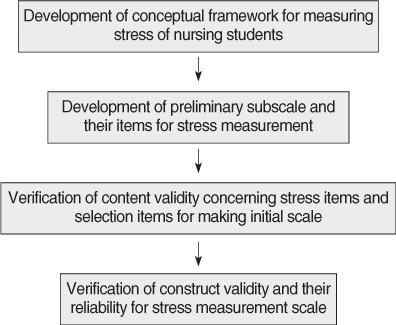
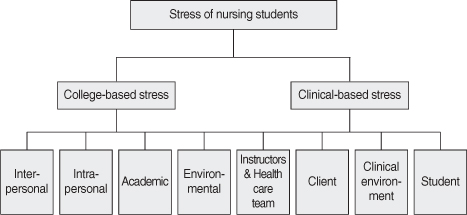
Figure 1
Research procedure.
Figure 2
Conceptual framework of stress in nursing students.
Figure 1
Figure 2
Development of a Stress Scale for Korean Nursing Students
Content Validity Index of Stress Items
General Characteristics of Students (N=617)
Factor Analysis of College-Based Stress Items (q1-40) (N=617)
Factor Analysis of Clinical-Based Stress Items (q41-60) (N=617)
Cronbach's alphas by factors
Table 1
Content Validity Index of Stress Items
Table 2
General Characteristics of Students (N=617)
Table 3
Factor Analysis of College-Based Stress Items (q1-40) (N=617)
Table 4
Factor Analysis of Clinical-Based Stress Items (q41-60) (N=617)
Table 5
Cronbach's alphas by factors
 KSNS
KSNS
 E-SUBMISSION
E-SUBMISSION


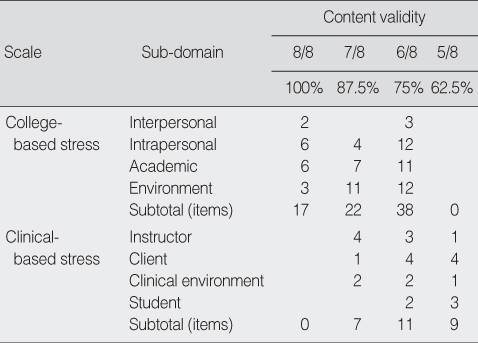
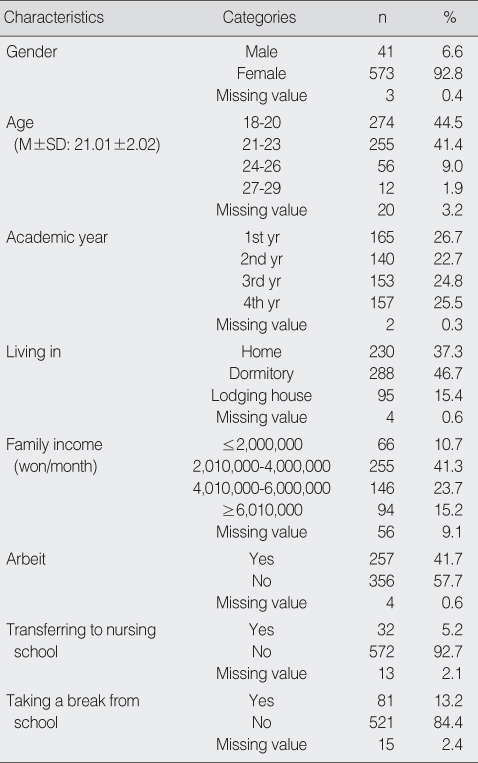
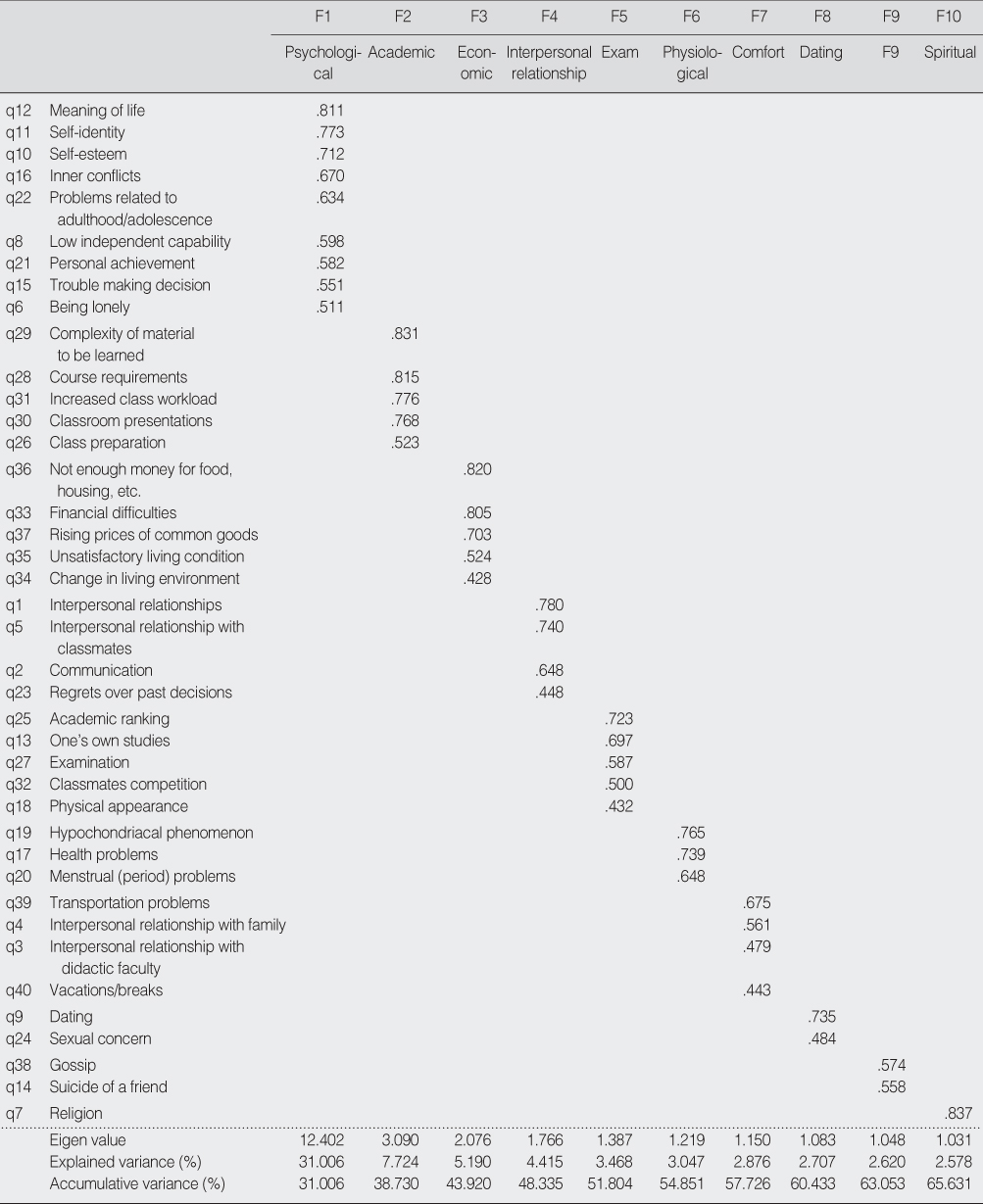
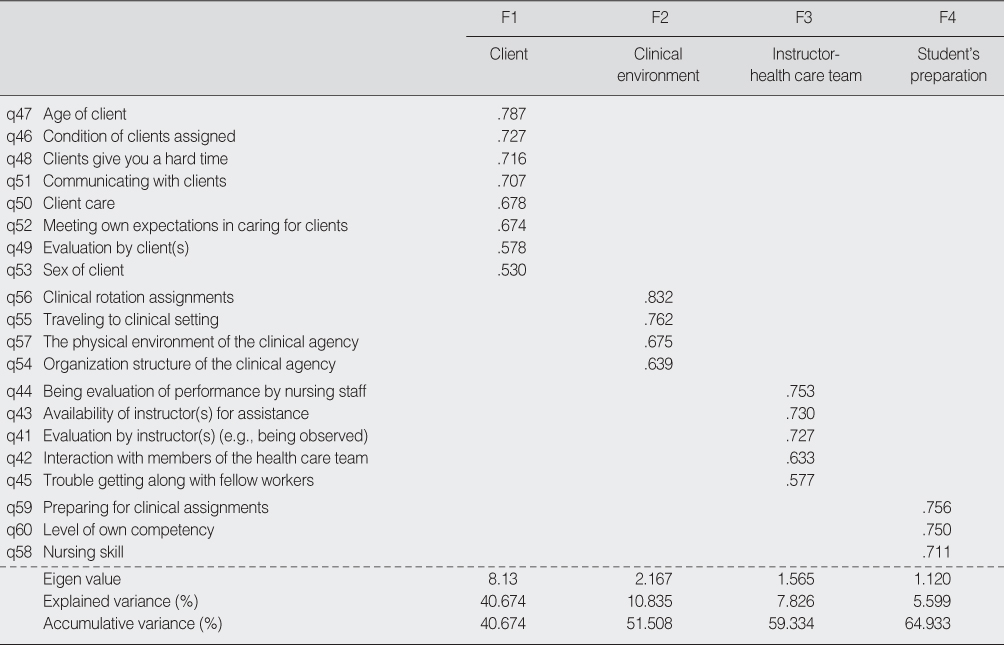
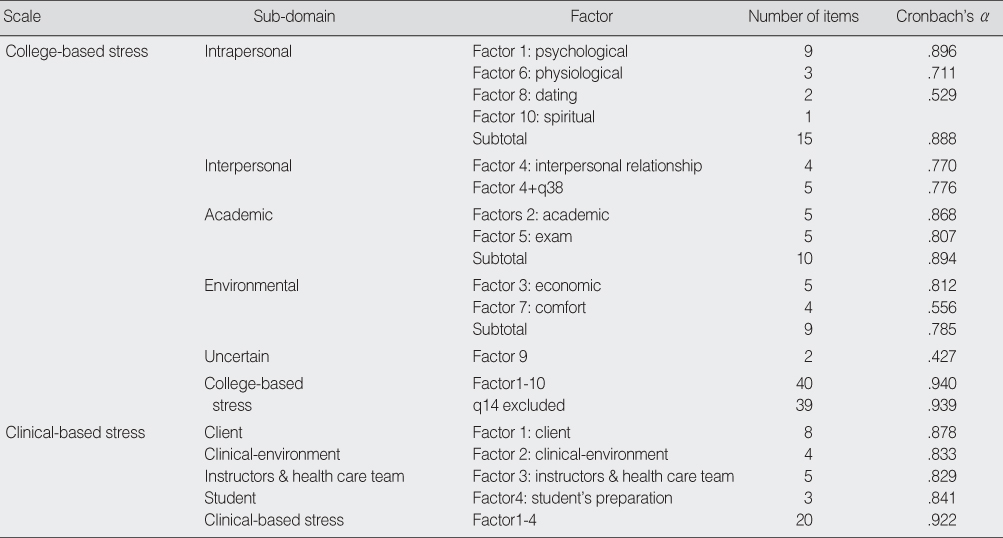
 Cite
Cite

